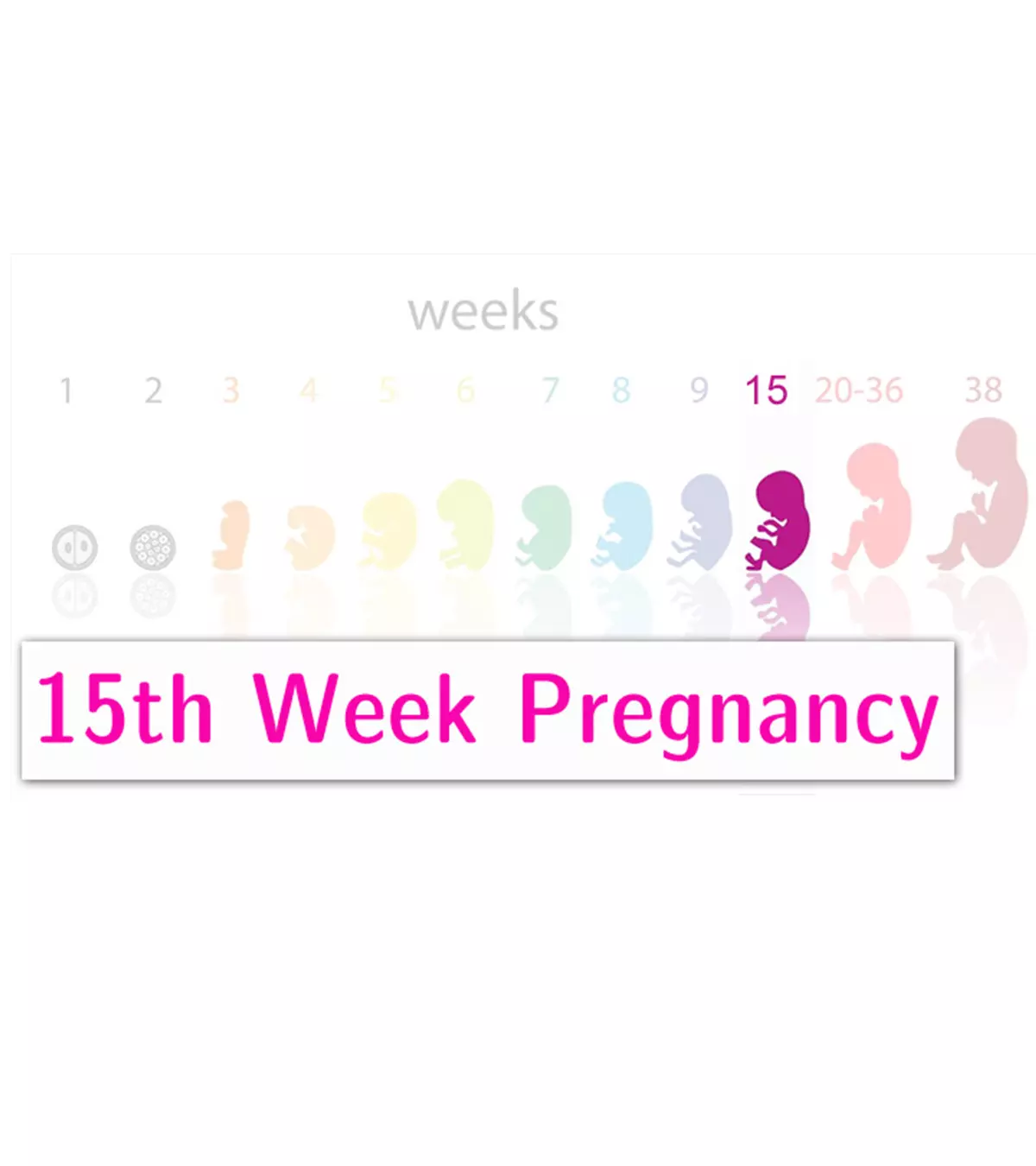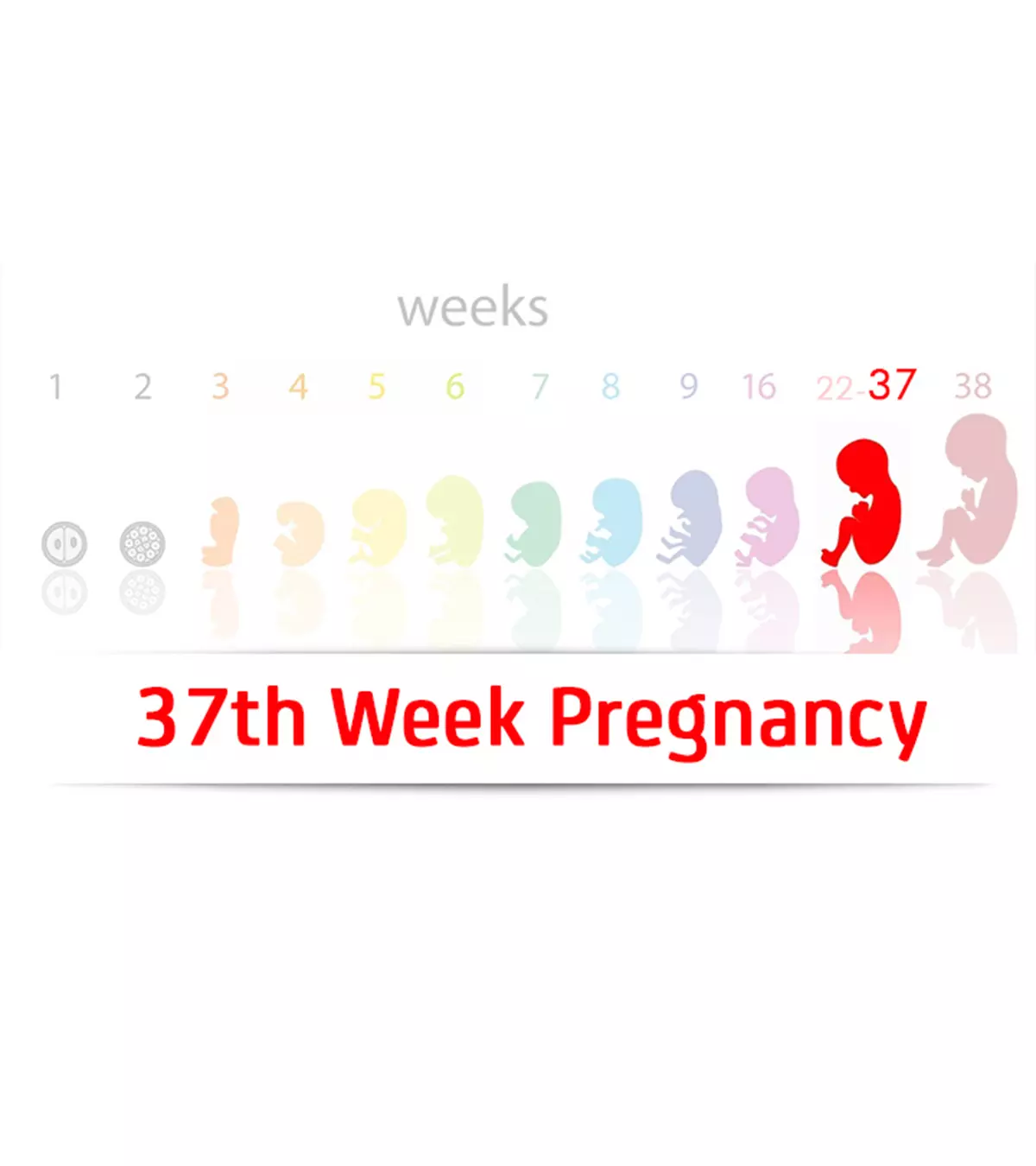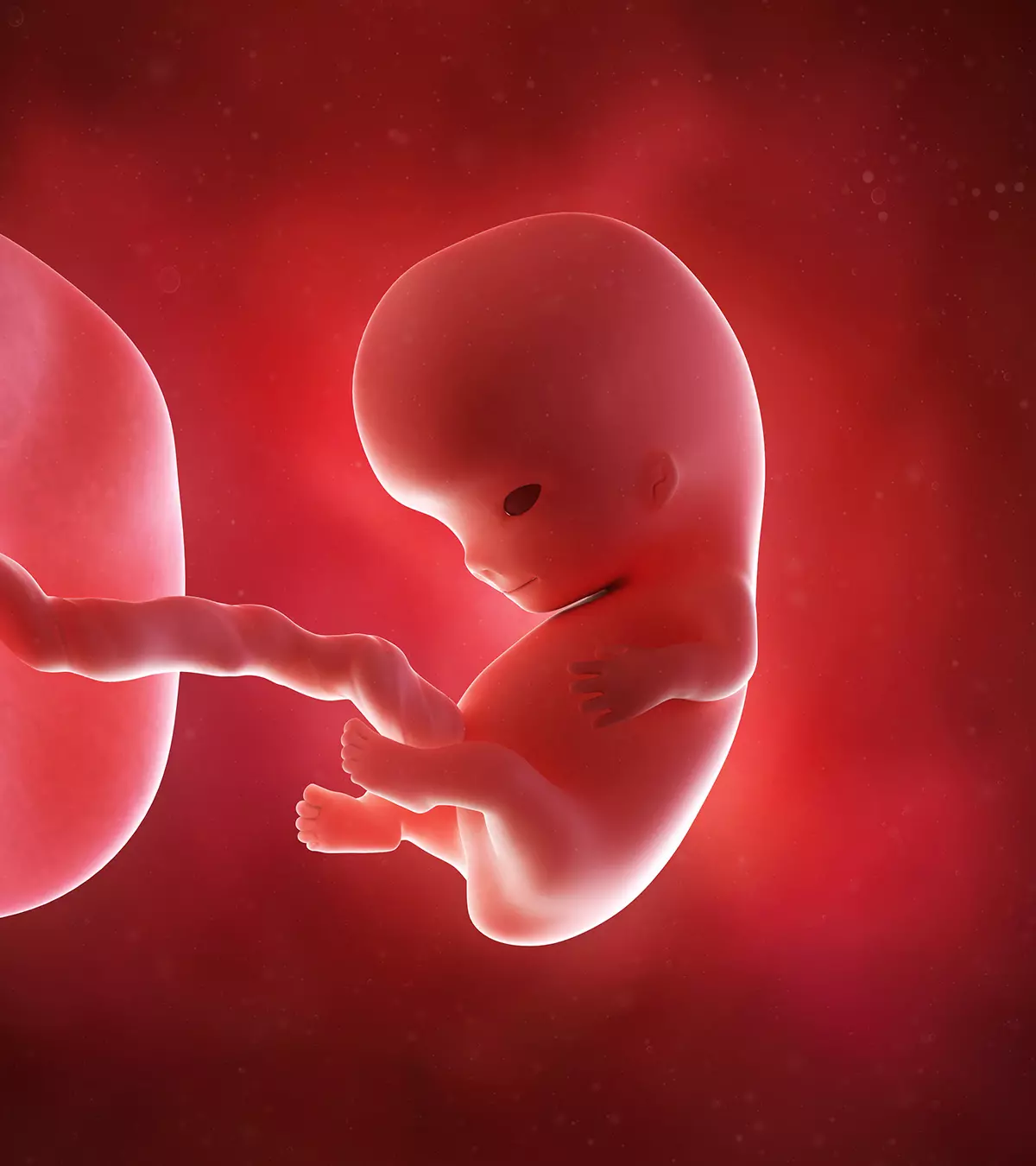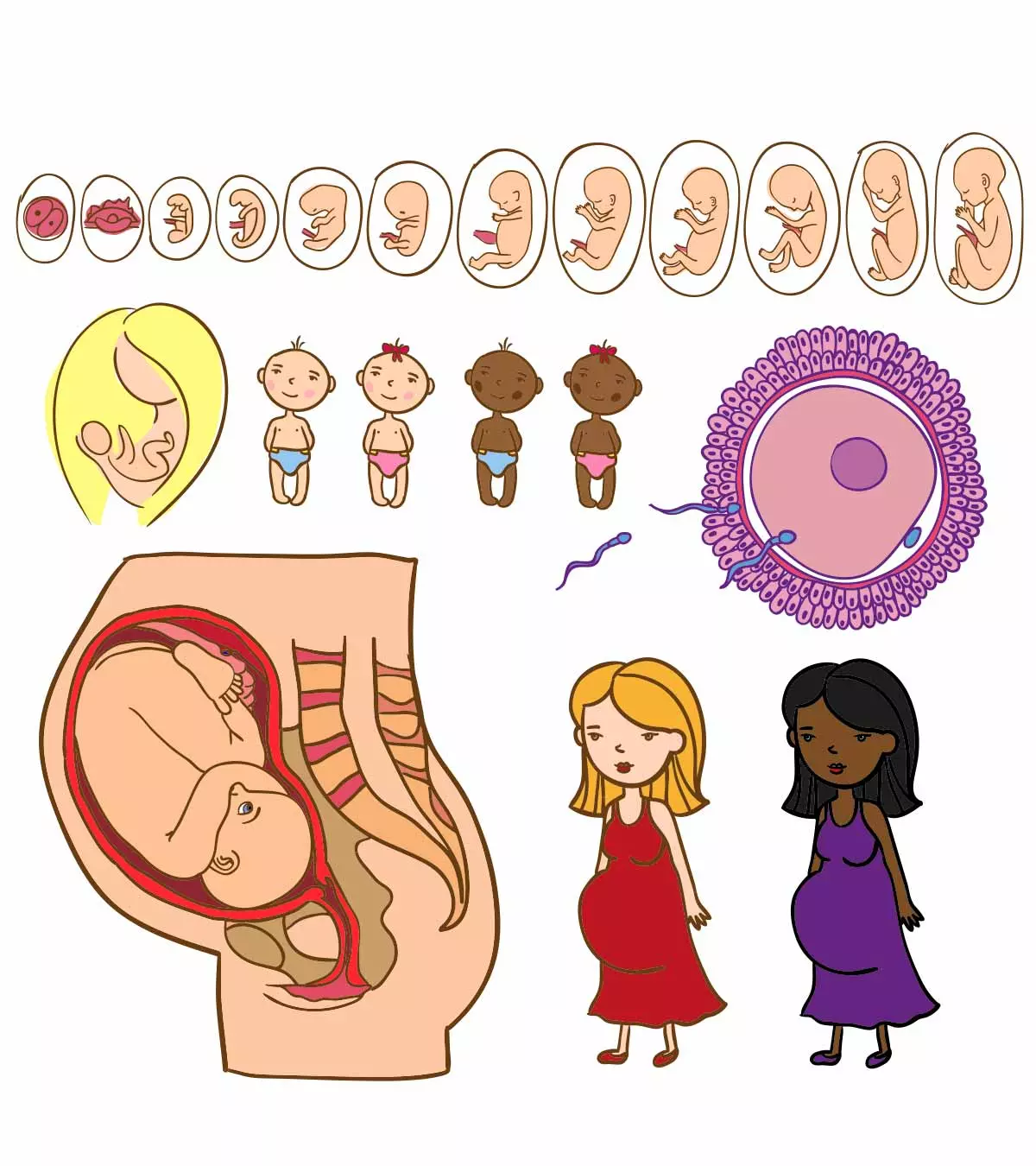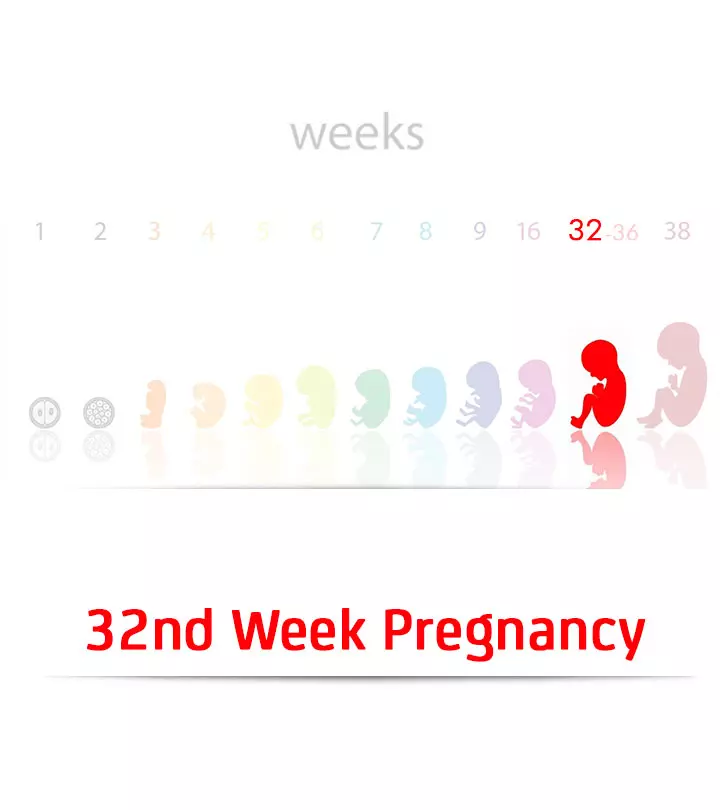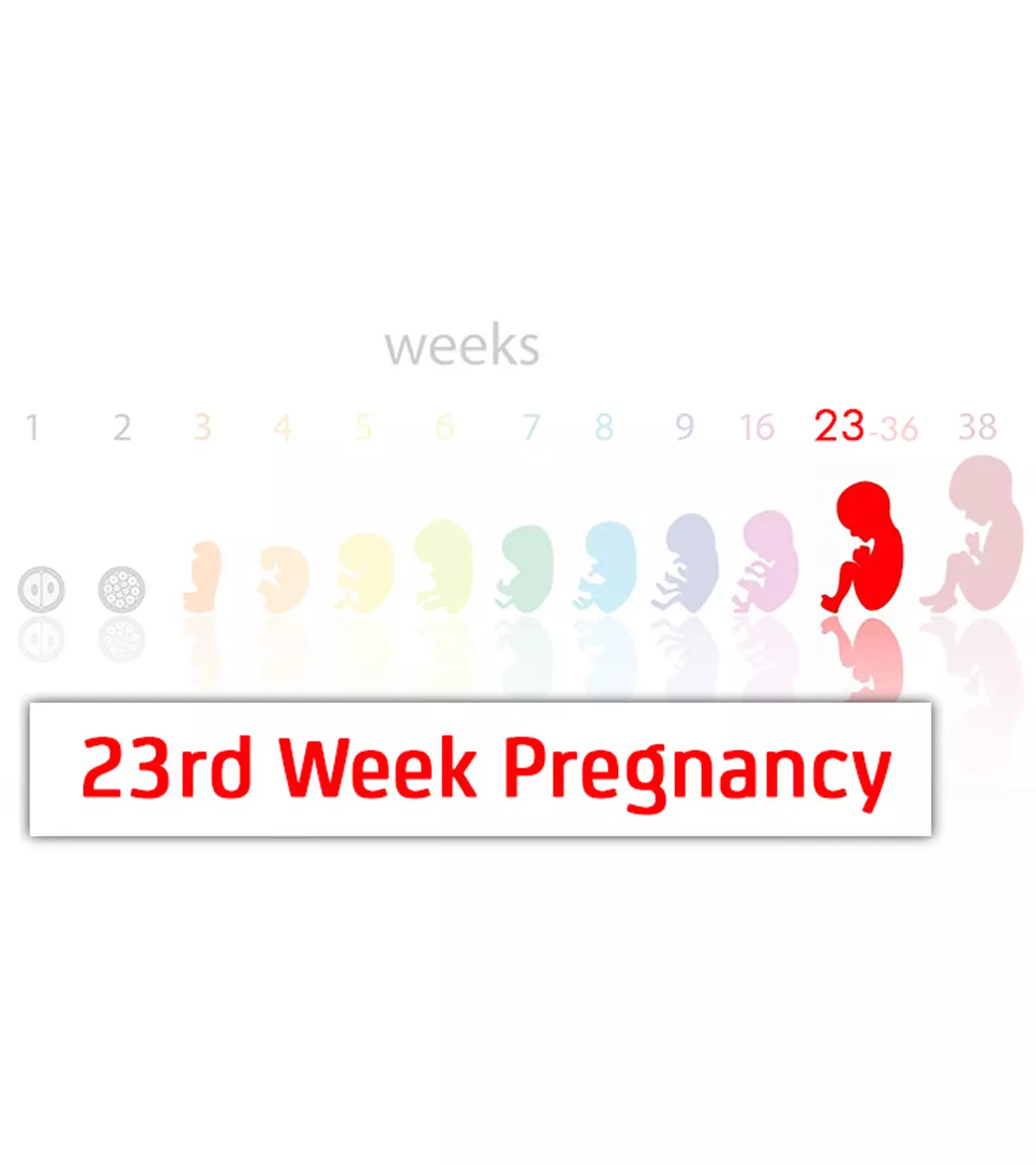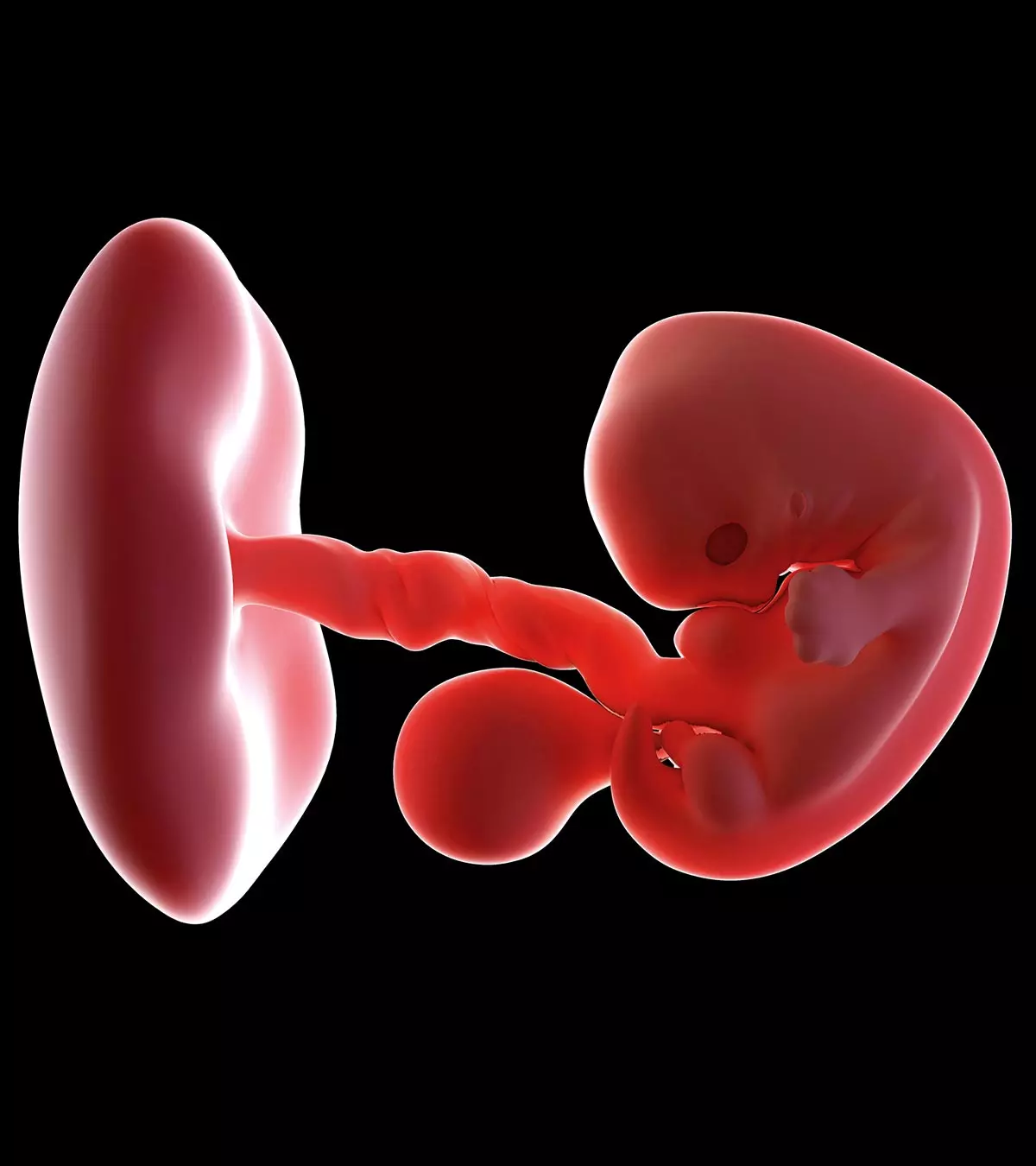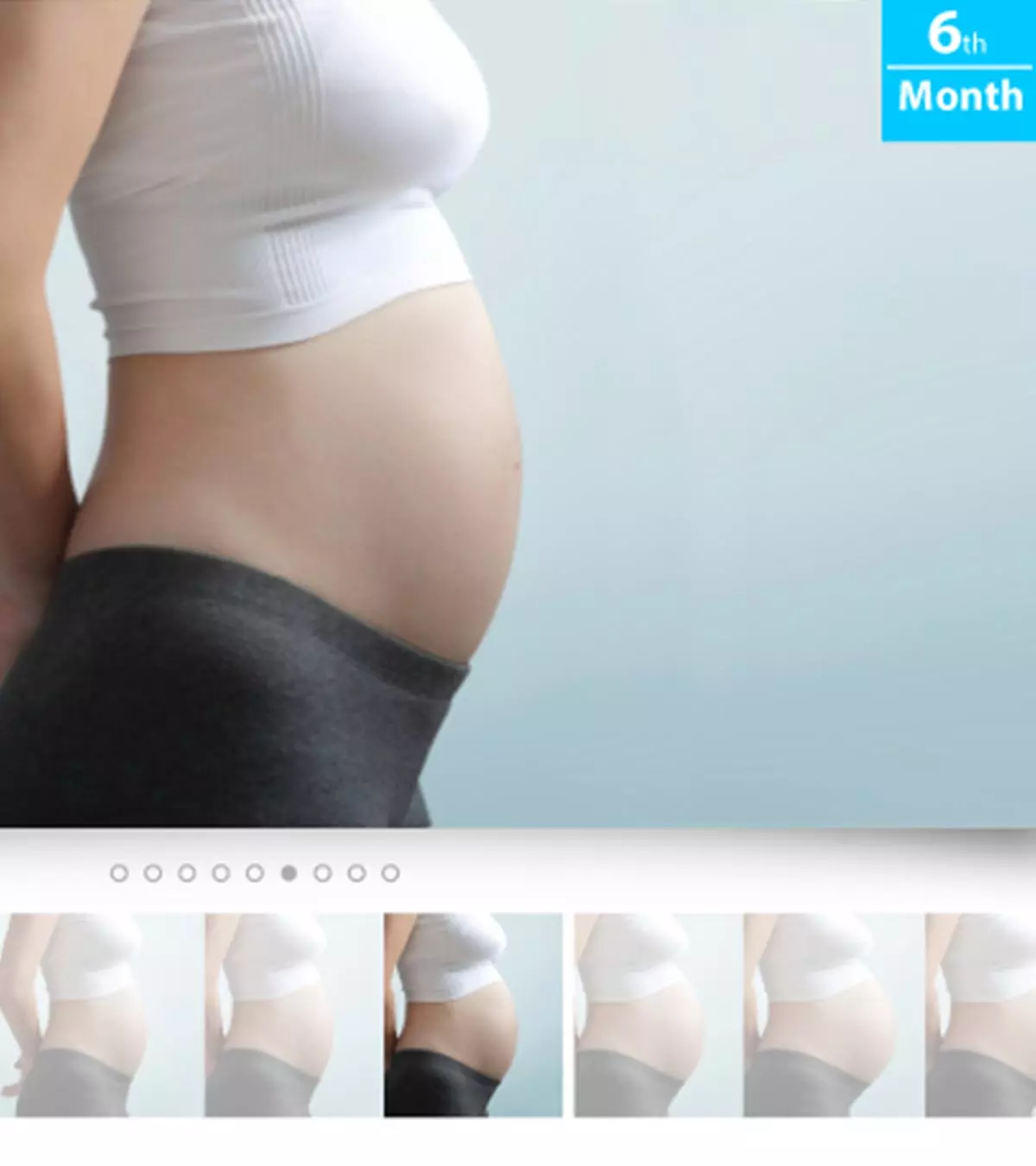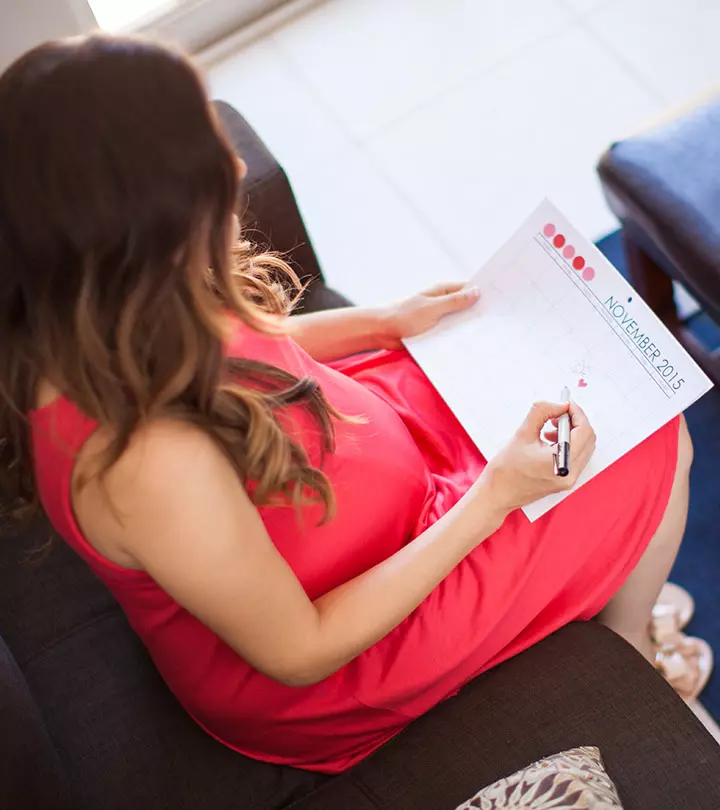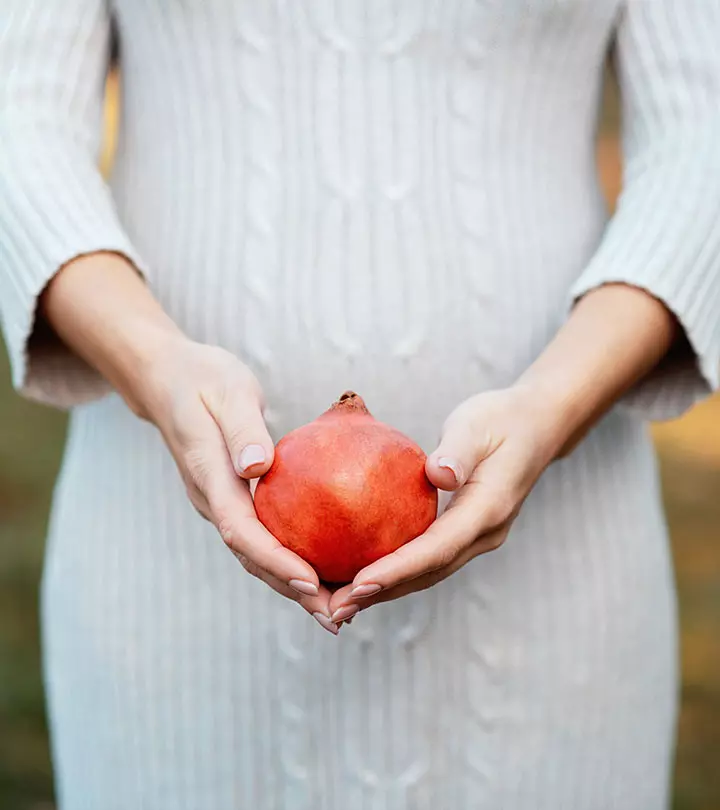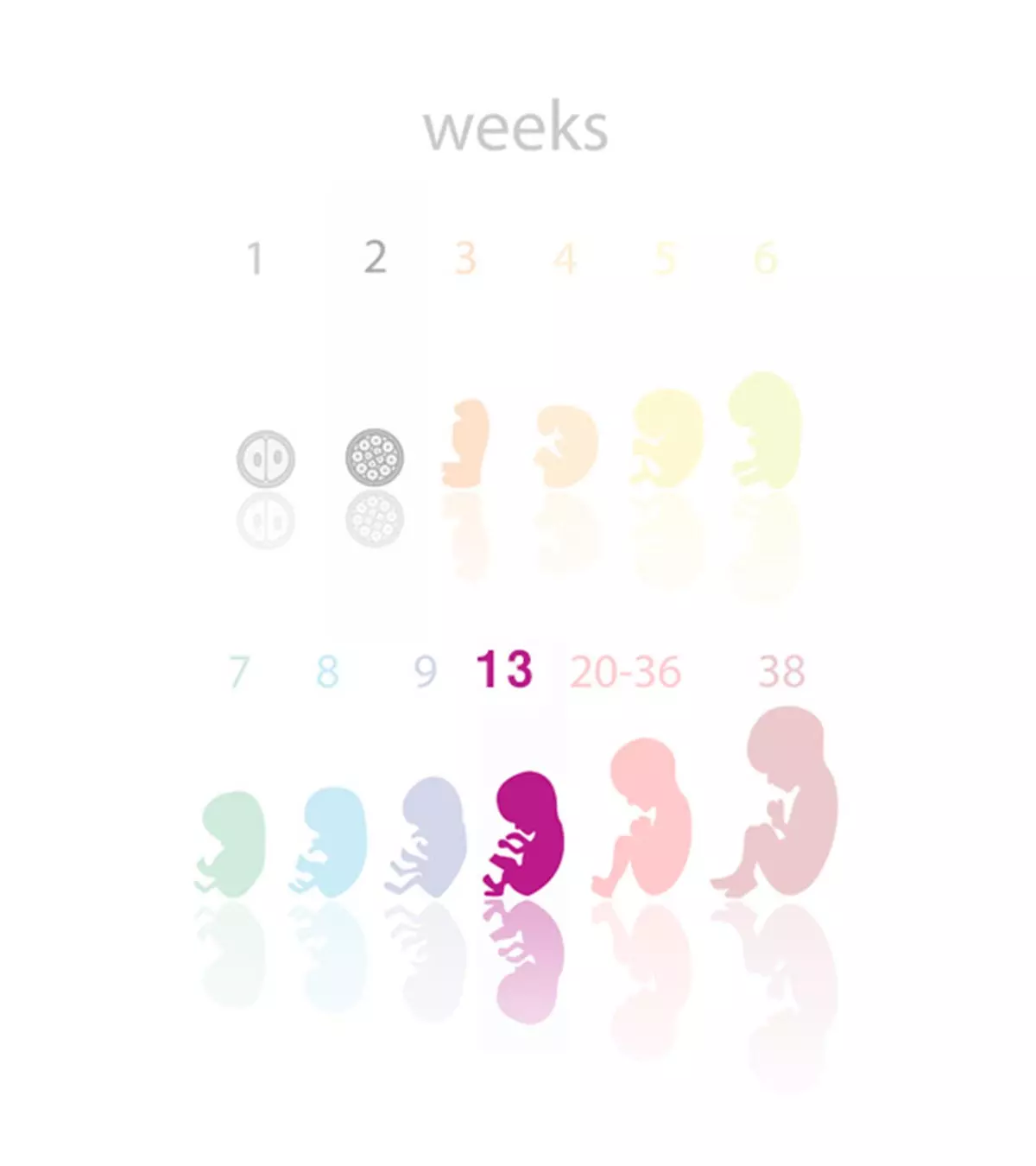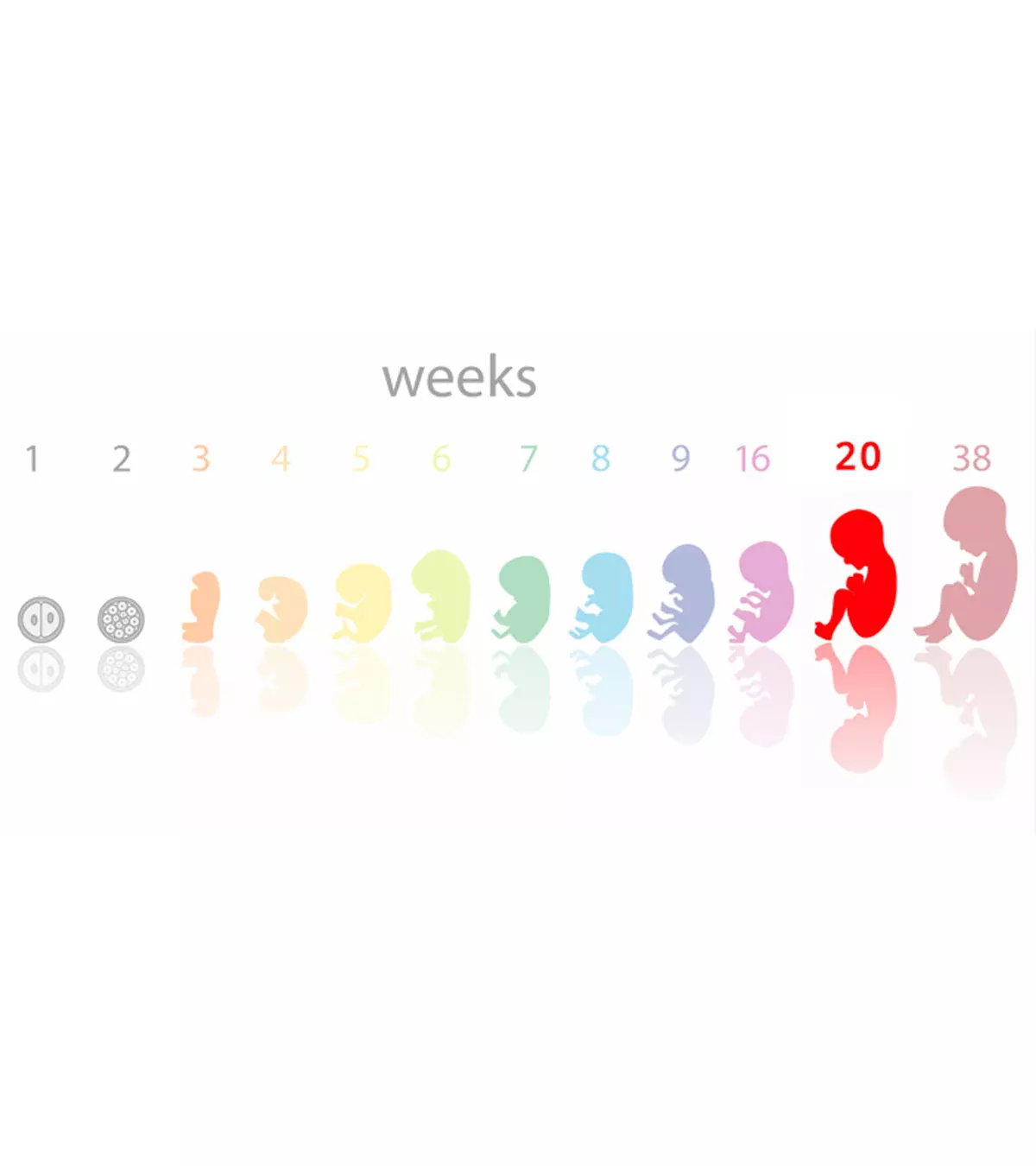
Image: ShutterStock
Key Pointers
- At 20 weeks, a fetus is approximately 25.6cm long and weighs around 300g.
- The baby’s fingers start developing fingerprints, and movements can be felt as wriggles and flutters.
- Pregnant women might gain weight and experience discomforts like leg cramps, heartburn, and pelvic pressure.
- Bodily changes during pregnancy may include a growing belly, stretch marks, and enlarged breasts.
How Many Months Pregnant Are You At 20 weeks?
In the 20th week, you are in the fifth month of pregnancy. Momjunction explains how the unborn baby develops and how your body changes this week.
How Big Is Your Baby At 20 Weeks?
At 20 weeks, your baby is about the size of a banana(1)
. The baby is about 10.08in (25.6cm, measured from head to toe) in length and weighs approximately 10.58oz (300g) (2).
Baby Development At 20 Weeks
Here is how the baby develops this week.
| Body parts | Development |
|---|---|
| Skin (3) | Oil glands called Sebaceous glands begin to work. Skin is covered with vernixiA white and creamy-textured biofilm on fetal skin that provides protection and maintains body temperature. . |
| Fingers (4) | Develop fingerprints. |
| Ears | The baby can hear muffled sounds. |
| Genitals | Can be distinguished during an ultrasound. In girls, the uterus is formed with eggs in the ovaries (5). |
| Larynx (6) | Is developing and starts moving. |
| Head (7) | Is covered with hair. |
| Brain nerves | Continue to develop. |
| Heart (8) | Beats at 120-160 beats/minute. |
| Muscles | Continue to grow. |
| Teeth | Permanent teeth start to develop beneath the gums. |
Fetal position and movements:
There is sufficient space inside the uterus for the fetus to move freely. You can feel the movement and kicks that feel like wiggles and flutters, also referred to as quickening. The fetus starts to suck its thumb, something that you can notice during an ultrasound. Also, the baby develops a regular wake-up and sleep pattern by this week.
Tamsyn, a mother of two, recounts her 20-week scan experience. She shares, “I feel the baby kick so much at the moment, so it was no surprise that he wriggled around for most of the ultrasound. We got to see everything we needed to in the end, though, and our baby was looking healthy and happy. The absolute highlight for me was when we were watching the baby touch his face and put his fingers in his mouth in 3D (i).”
What Symptoms Of Pregnancy Do You Experience In The 20th Week?
Pregnancy symptoms that you may experience during this week include:
- Weight gain: According to the American Pregnancy Association (APA), the weight needs to be as per the BMI (9):
| BMI | Below 18.5 | 18.5 – 24.9 | 25 – 29.9 | 30 and Above |
|---|---|---|---|---|
| Weight gain (Pounds) | 28-40 | 25-35 | 15-25 | 11-20 |
- You may develop food cravings, a liking or disliking towards certain foods, due to hormonal fluctuations.
- Vaginal discharge, which prevents any bacteria from entering into the uterus through the vagina. Be sure to speak with your doctor or obstetrician if the white vaginal discharge during pregnancy has a foul odor.
- Be sure to speak with your doctor or obstetrician if the discharge has a foul odor.
- You could experience leg cramps at night, due to a deficiency of magnesium or calcium.

- While the symptoms of morning sickness, such as vomiting and nausea, may have decreased, the hormone progesteroneiA female hormone responsible for menstruation and pregnancy. still affects the digestive tract by causing it to relax, resulting in slower digestion.
- The stomach is pushed upwards by the growing uterus, causing the gastric acids to enter the esophagus to cause heartburn.
- Water retention in the body causes swelling of the hands and feet. Sudden or excessive swelling could be an indication of preeclampsiaiA pregnancy-related disorder characterized by high blood pressure, water retention, and protein content in urine. .
- The relaxation of the mucous membranes causes constriction in the nasal membranes that lead to nasal congestion and shortness of breath.
- Pressure on the pelvic and rectal nerves due to the growing uterus causes swelling, or hemorrhoids. According to the US Department of Health and Human Services, it affects up to 50 percent of expectant women.
- The excess blood flow towards the lower part of the body causes pooling of blood in the leg nerves, resulting in a varicose vein.
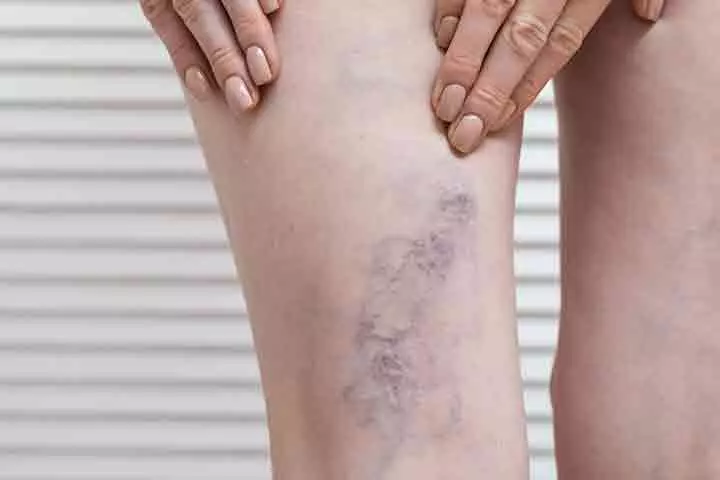
- Increased blood flow to the lower part of the body sometimes deprives the brain of sufficient blood supply, causing dizziness.
- The slowed digestion causes the food to stay longer in the digestive tract causing constipation.
- Braxton Hicks contractions are irregular and painless contractions that prepare the body for labor.
- The leg cramps, increased frequency of urination, and the body aches may disrupt your sleep at night.
- The hormonal fluctuations can cause headaches during the week.
- With an increased blood flow in the body, you may experience hot flashes.
- You may develop restless leg syndrome (RLS), a tingling sensation in the leg and an urge to move the legs in an uncontrolled manner. It could be caused due to low hemoglobin (10).
Along with these symptoms, you will experience certain physical and psychological symptoms as well.
Changes In Your Body In The 20th week

- Enlarged belly (due to the growing uterus) and appearance of a baby bump, with a protruding navel
- Enlarged breast as the body prepares for milk production
- Darker nipples and areola due to pigmentation
- Blue or green vein around the breast due to increased blood flow
- Hair and nail growth as a result of hormonal fluctuations
- Linea nigra, a darker line running from the belly button to the pubic bone
- Stretch marks as a result of small tears in the skin
- Mood swings due to hormonal changes
- Anxiety and fear of health issues, labor, and parenthood
If the symptoms are severe or unusual, go to the doctor immediately.
Your OB/GYN Visit
Here’s what might happen during your doctor’s visit this week.
- Weight check
- Blood pressure check-up
- Urine test
- Ultrasound scan: An anomaly scan, which is a detailed scan, will be done this week to track the development of all the organs and growth of the baby. This scan helps to determine any physical problems including spina bifidaiA birth condition characterized by spinal cord defects, identified by its protruded tissue requiring surgery. in the baby (11).
Next, we have a few tips to help you stay healthy and happy during this time.
 Quick tip
Quick tipTips For Mom-to-be

Here are some prenatal care tips that can be useful for expectant mothers this week.
- Drink plenty of water.
- Avoid fatty and deep-fried foods that worsen heartburn. Add fiber to your diet to reduce constipation.
- Eat smaller meals at regular intervals.
- Try to maintain the right posture to prevent a backache. Use comfy cushions or pillows while sitting or sleeping.
- Try and find a sleeping position that lets you sleep comfortably.
- Adopt a healthy lifestyle. Eat home-cooked food and add whole grain bread, cereals, milk, cheese, egg, and nuts to your diet.
- Avoid smoking, drinking alcohol, and taking illicit drugs.
- Engage in physical exercises like walking.
- Try not to stress about little things.
- Get enough rest.
- Avoid taking any medication without your doctor’s advice.
- Wear loose and breathable maternity clothes.
- Get regular dental check-ups done.
- Take prenatal vitamins including calcium, folic acid, and iron.
- Sleep with your head elevated to get relief from nasal congestion.
- Spend time with friends and family members.
- Search for childbirth classes in your area to learn more about childbirth education.
- Do not miss any doctor or prenatal testing appointments.
- Read pregnancy books about prenatal care, labor, and delivery.
- Engage yourself in activities that keep you happy.
Spend time with your partner and seek his support to make this period less stressful.
 Quick tip
Quick tipTips For Dad-to-be

Here’s how the dad-to-be can participate in the pregnancy:
- Help you with household activities.
- Be with you during prenatal visits.
- Create a pleasant environment at home.
- Plan an outing and maternal shopping.
- Organize a surprise baby shower (if you haven’t already)
- Give her a good neck and foot massage in pregnancy.
 Quick tip
Quick tipFrequently Asked Questions
1. How often should I feel my baby’s kicks at 20 weeks?
Every baby is different and so are their movements. Therefore, there is no specific number of kicks that you should feel. Once your baby starts moving, you will gradually understand their movement pattern. You may find them active at specific times of the day, such as when you are sleeping or have eaten. Although there is no standard number of kicks, you should check your baby’s movement regularly to ensure they are doing well (12).
2. In which week of pregnancy is my baby fully formed?
Your baby is fully formed by week 12. They have all the organs, muscles, limbs, and bones. Their arms are of normal size, while their legs are a little short. Their kidneys and heart are functioning, and their breathing and digestion are also starting to develop (13).
3. What exercise routines are safe and recommended during pregnancy?
Walking, squats, and pelvic tilts are some exercises that are considered safe and beneficial for expecting women. However, before starting any exercise program, consult with your doctor to know about the exercises suitable for your individual needs and overall health (15).
4. Where is my baby at 20 weeks in my stomach?
At 20 weeks of pregnancy, your baby is in your uterus, developing and growing rapidly. Typically, the baby is positioned halfway between your pubic bone and your navel. However, it’s important to note that the baby’s exact position can vary from one pregnancy to another. Also, the baby may be in a head-up (breech) or head-down position, which usually changes as the baby keeps moving inside the womb (16).
You enter the second trimester once at 20 weeks of pregnancy. It is the phase of various fetal developments, such as the baby will develop fingernails, the larynx will start moving, and the head will be covered with hair. You will now be excited to feel the baby’s kicks since there is enough space in the uterus to move around. You may notice your weight increasing, develop certain food cravings, and experience slow digestion. Sometimes, you may also develop hemorrhoidsiSwollen, painful, and bleeding veins in the rectum and anus. or varicose veins. Drink plenty of water, eat smaller meals, and engage in physical activity to stay healthy.
Infographic: Body Changes During 20th Week Of Pregnancy
Being 20th weeks pregnant means you’re in the mid of your second trimester, and your fetus is about the size of a banana. Your body undergoes various changes at this stage while your baby grows and develops its organs. Read the following infographic to learn about various physical changes during the 20th week of pregnancy.
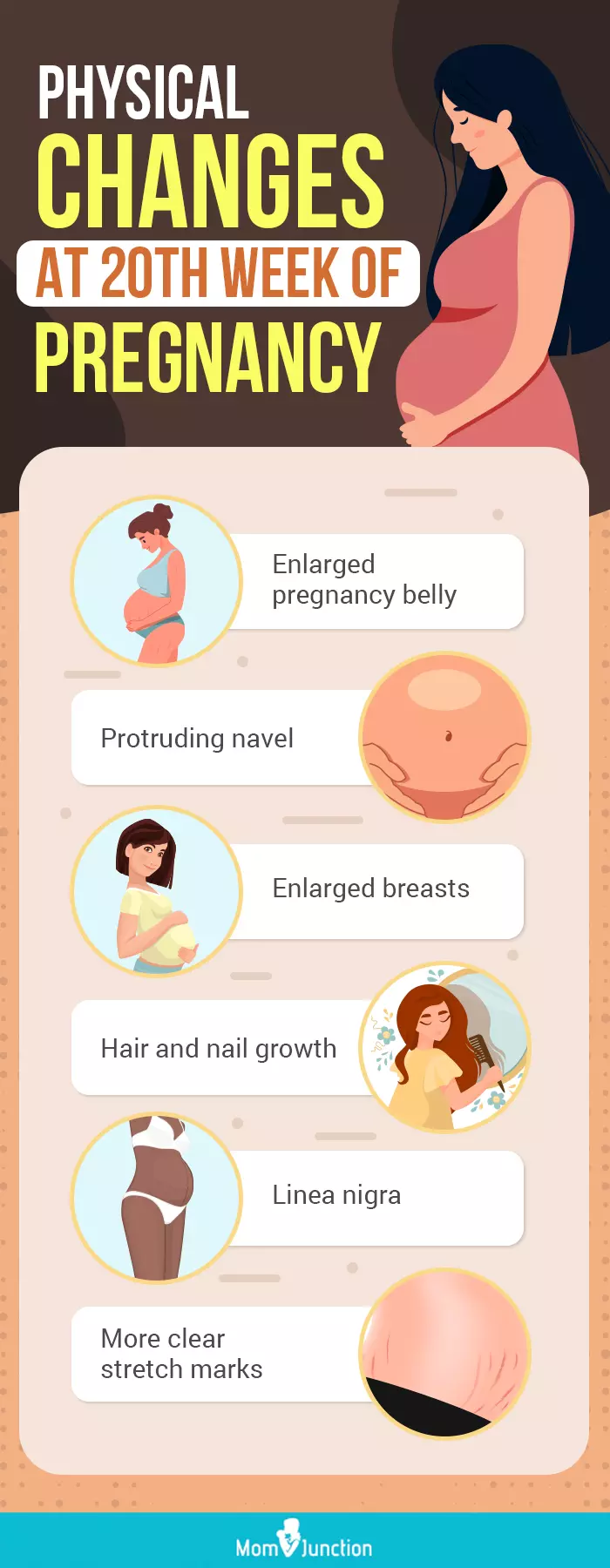
Illustration: Momjunction Design Team
Experience the joys of pregnancy in week 20! Learn about the development of your baby and how to take care of yourself.
Personal Experience: Source
MomJunction articles include first-hand experiences to provide you with better insights through real-life narratives. Here are the sources of personal accounts referenced in this article.
i. 20 weeks;https://maxandmeblog.blogspot.com/2012/06/20-weeks.html
References
1:Week by Week Fetus Size Demonstrated by Fruits; Expecting Parents Alliance Of America
2: Fetal Development; UNSW Embryology; Journal:Seminars in Fetal & Neonatal Medicine
3: Fetal Growth And Development; South Dakota Department of Health
4: Pregnancy – week by week; The State of Victoria and the Department of Health & Human Services(2012)
5: Pregnancy Week By Week; Due date calculator
6: Prenatal Summary; The Endowment For Human Development
7: Baby Development Month By Month; American Pregnancy Association
8: 20 weeks pregnant; Raising Children Network (Australia)(2017)
9: Pregnancy Weight Gain Chart; American Pregnancy Association
10: R. Gupta, M. Dhyani, T. Kendzerska, et.al ; Restless legs syndrome and pregnancy: prevalence, possible pathophysiological mechanisms and treatment; U.S. National Library of Medicine; Journal: Acta Neurol Scand.(2015)
11: Neural tube defect; Healthdirect Australia
12: Baby movements during pregnancy; Pregnancy birth & baby
13: Pregnancy at week 12; Pregnancy birth & baby
14: Pregnancy Week 20; American Pregnancy Association
15: Exercise During Pregnancy; American Pregnancy Association
16: Pregnancy Week by Week; March of Dimes
Community Experiences
Join the conversation and become a part of our nurturing community! Share your stories, experiences, and insights to connect with fellow parents.
Read full bio of Dr. Sangeeta Agrawal
Read full bio of Sakshi Mishra
Read full bio of Rebecca Malachi
Read full bio of Aneesha Amonz










